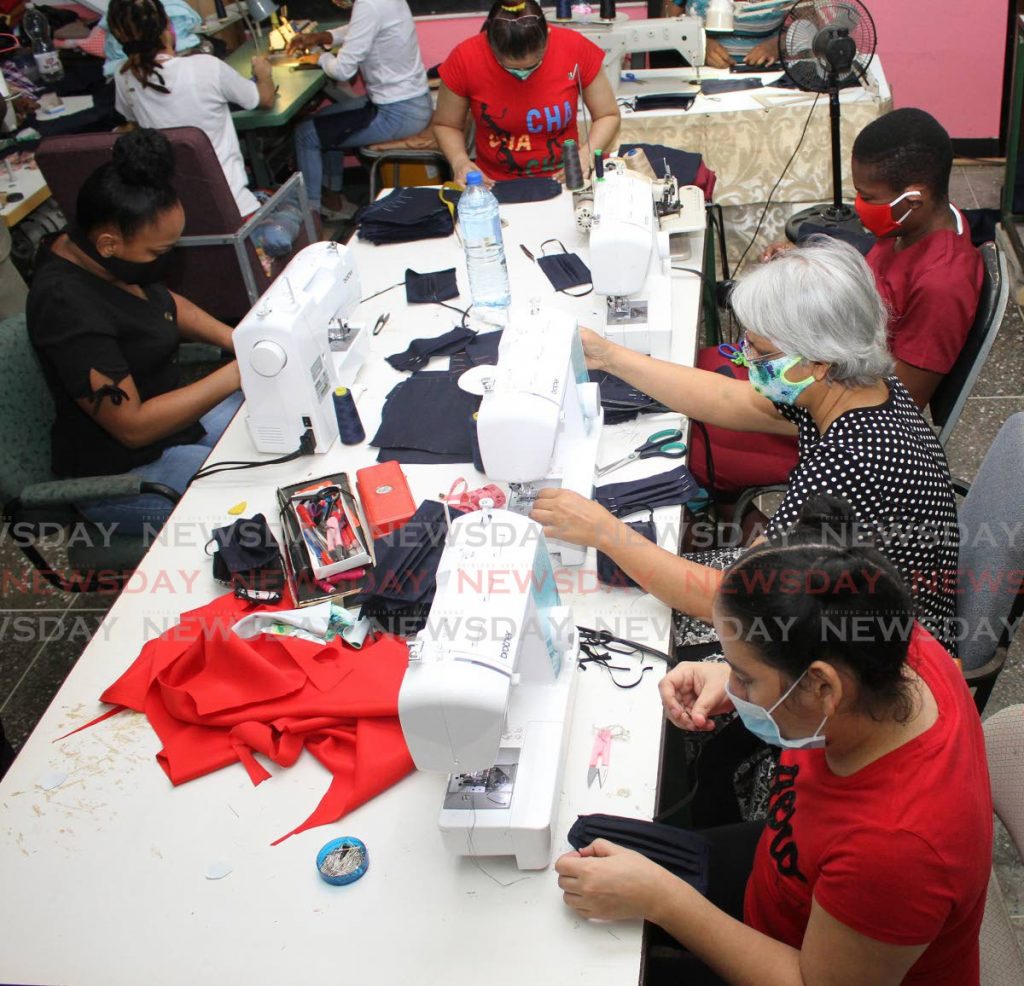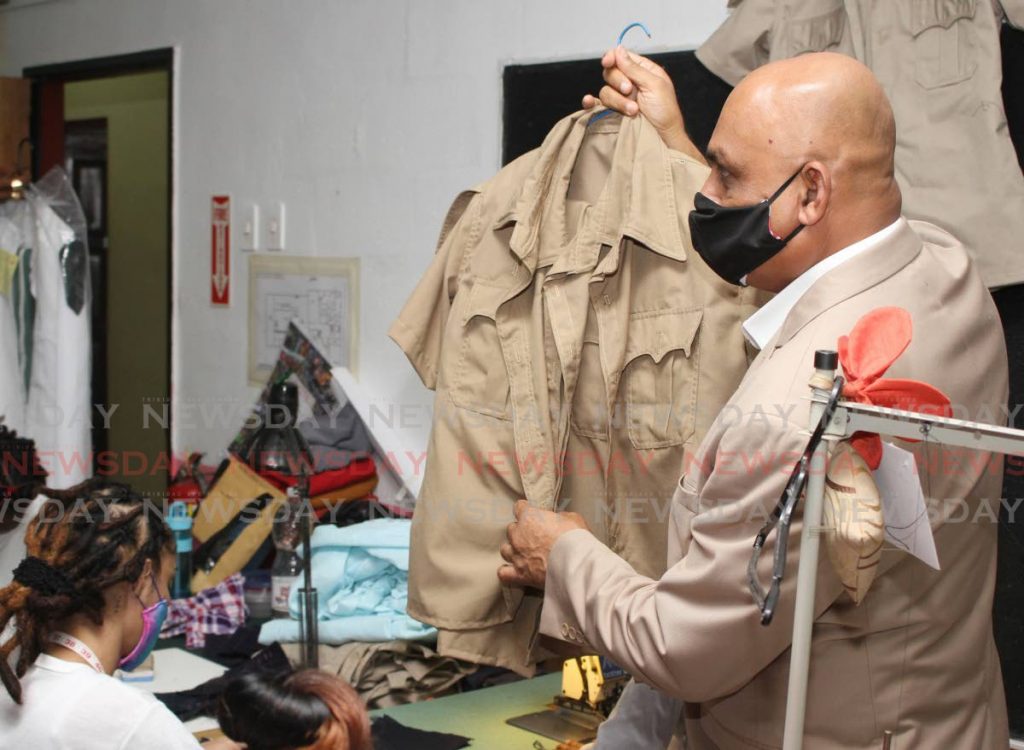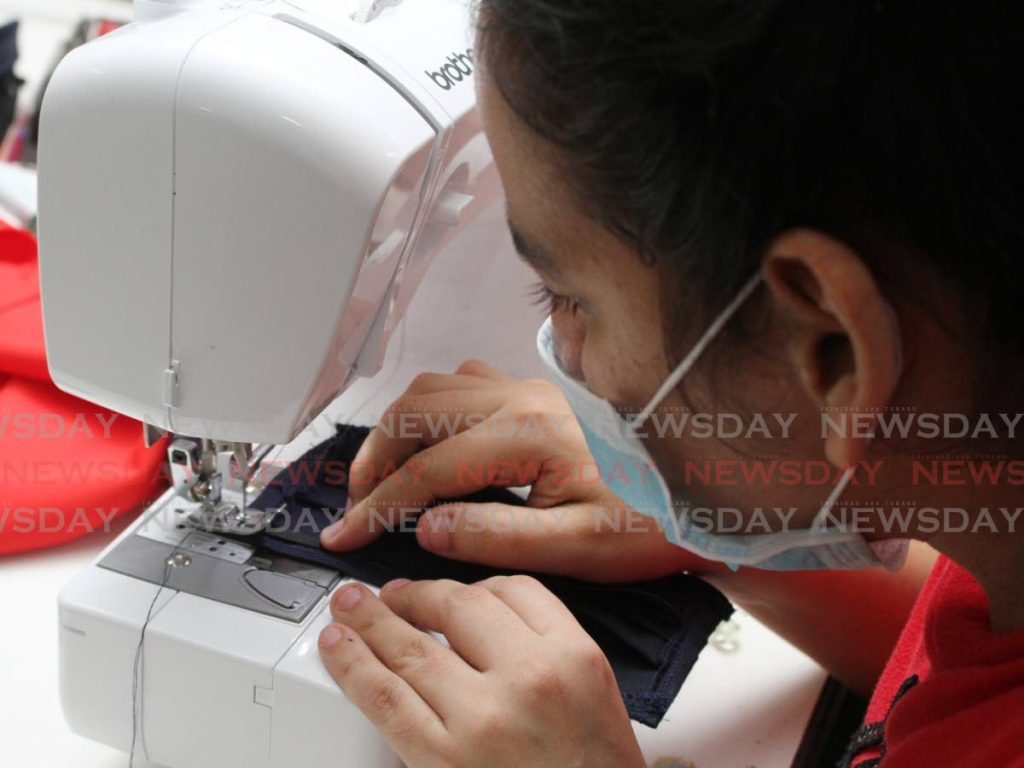Prisoners join fight against covid19: making 3,800 masks

INMATES AT PRISONS across the country took matters into their own hands in the fight against covid19 through their tailoring department, which is making 3,800 masks – one for each inmate.
On Thursday at the Women’s Prison in Golden Grove, Newsday got a first-hand look at the inmates in action as they produced the masks. Acting Commissioner of Prisons Dennis Pulchan told Newsday inmates volunteered to help make the masks and despite a small delay, they made, on average, 500 a day. Up to press time on Saturday, the prisoners had completed 2,500 masks.
“We have the tailoring department at the Maximum Security Prison, where there are 25 machines working. We have at the women’s prison, where there are about 20 machines working. And we also have at the Port of Spain prison, and in Carrera Island,” Pulchan said.The inmates made masks out of – cotton and polyester. The cotton masks have a pleated design, and are sewn with a space to accommodate filters. The polyester masks are sleek and breathable with a thin lining.
The prisoners work on average eight hours a day. Some days they tried to work for ten but prison officers concerned about their health would not allow them to overwork themselves. They get their materials from various charities.
Such was the pace of the workers in the tailoring department that between Tuesday and Wednesday they had run out of materials and had to be re-supplied. Although he was careful not to name them, Pulchan still thanked the people responsible for supplying the cloth needed, for their contributions.

He said this is not the first time the tailoring department has supplied the prison with equipment.
“It is quite a lot of stuff that is made in the tailoring shop here. They make uniforms, suits, pants, vests, tablecloths and wide variety of other clothing items. They even make cushions.”
As one of the means to rehabilitate prisoners, the department gives inmates an occupation while behind bars and a marketable skill for when they leave.
Pulchan said at Christmas officers bring in cloth and for a small fee the prisoners make curtains and bedsheets for the officers.
“They would use the funds to refurbish the machines and keep the shop running,” Pulchan said.
Pulchan said prison officers would usually buy their own masks, but donations from various organisations also supply the officers with masks.
Masks are not the only means the Prison Service is using to protect prisoners and prison officers from covid19. Newsday was told extensive screening, daily sanitising and an information drive are helping to keep the virus out and keep prisoners informed as to what is happening concerning the virus.
Medical experts and at the prison said the screening process is quite specific. At the first entrance officers encourage you to wash your hands and sanitise. They have enforced a “no mask, no entry” rule. They have also restricted the flow of people to limit contact.
Doctors said they don’t allow people to go into different departments unnecessarily. They communicate by phone. And if officers are in different departments, they are now put on different shifts so there would be a minimal number of people in the prison, while still keeping it secure.
Prisoners meet with their families virtually instead of physically, so there are fewer people from outside entering the prison.

The prisons have also been also supplied with ten wind tunnels which spray a disinfecting solution. Pulchan told Newsday the solution is a mixture of 65 per cent water and 35 per cent hydrogen peroxide.
“We had them installed in all stations so all officers coming to the prison or visitors to the prison must pass through that wind tunnel. And the solution is a safe level so it doesn’t harm you but it kills bacteria,” Pulchan said.
The tunnels were donated to the prisons by the British High Commission along with Caribbean IMPACS. The commission realised the risk of prisoners getting infected and the rapid pace at which the infection could spread, so the two organisations paid for the building and installation of the tunnels.
Even with the methods in place, there have still been cases of covid19 among prisoners and officers. Earlier reports indicated that three people, two prison officers and a prisoner, tested positive for covid19.
Newsday understands that the prisoner is being treated in a well-guarded room at the Caura Hospital, while the prison officers are at Caura and Couva hospitals. Contact tracing is under way for the prison officers and all the prisoners close to the infected inmate have been tested and quarantined. Pulchan said results are still awaited.
On March 17, fear and uncertainty among the prisoners over the service’s management of the virus sparked a riot in the south wing at Golden Grove. Prisoners, afraid of the unknown got wind that prisoners were being released in other countries, began making demands to be freed. The riot was eventually contained, but it came at a cost.
“Officers were attacked. One is on sick leave with a broken jaw still. Part of the south prison was destroyed. We had to evacuate the entire south wing, some 400 inmates were displaced,” Pulchan said. “Now, after much information was given to them, they are more confident that everything is being done to protect them.”
The riots also resulted in a move by Attorney General Faris Al-Rawi to announce the early release of hundreds of prisoners.
Newsday understands most of these prisoners are still inside however. Bail hearings are being held weekly to review criminal records and recommendations by the DPP, police and the public defenders office, so while hundreds were selected, they still have to go through a lengthy process.
In the meantime senior officers go to prisoners, inform them of the situation outside, and tell them everything possible is being done to protect them.
Officers also remind them through the use of handouts of the best practices for sanitising, and the prison service also sanitises areas at least twice daily. The prison radio station, Rise Radio, also shares information on the latest developments on covid19, and reiterates best practices and methods.
The prison service also does its own screening of inmates: officers from the health department go on “medical parades” and treat any ill prisoners.
“So much more is being done than we did before," Pulchan said, “This is an epidemic that we cannot allow to come in the prison.”

Comments
"Prisoners join fight against covid19: making 3,800 masks"